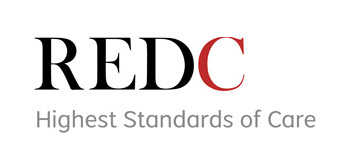There are multiple levels of care for the treatment of eating disorders, including outpatient, intensive outpatient (IOP), partial hospital program or intensive day program (PHP or IDP), Residential, and Inpatient. All levels of care of eating disorder treatment should involve a multidisciplinary care team that covers the four pillars of eating disorders care: psychotherapy, nutrition, medical, and psychiatry.
Multidisciplinary team: The core multidisciplinary care team: includes professionals in the areas of psychotherapy, nutrition, medical, and psychiatry, plus nursing, mental health/eating disorder tech level staff, and other practitioners of other interventions, such as yoga, art, or mindfulness, as applicable.
Outpatient:
- Individual, family, and/or group psychotherapy, medical nutrition therapy, with medical and psychiatric services, as needed.
- Total typical time in treatment per week is approximately 1-4 hours per week, across the multiple disciplines.
- Length of stay typically ranges from 6-18 months.
Intensive Outpatient Program (IOP):
- Group-based treatment including group psychotherapy and nutrition counseling and education, therapeutic group meal exposures, and experiential interventions (e.g. yoga, art therapy).
- Typical time in IOP per week is 9-12 hours per week (3-4 times/week for 3 hours/day).
- Length of stay typically ranges from 4-12 weeks.
- Note: Individuals in IOP also have OP individual and/or family therapy and nutrition sessions, with medical and psychiatric services, as needed, so total treatment time per week ranges from 11-16 hours per week.
- Individuals may step in to IOP from OP or step down in to IOP from PHP.
- Upon successful discharge from IOP, individuals typically step into OP.
Partial Hospital Program (PHP):
- Group-based treatment including group psychotherapy and nutrition counseling and education, therapeutic group meal and snack exposures, recovery skills practice, and experiential interventions (e.g. yoga, art therapy), plus individual/family therapy, nutrition, medical and psychiatric monitoring.
- Typical time in PHP per week is 30-60 hours per week (5-7 times/week for 6-12 hours/day).
- Length of stay typically ranges from 4-7 weeks.
- Total treatment time per week ranges from 30-60 hours per week.
- Individuals may step into PHP from OP or IOP or step down into PHP from Residential or Inpatient.
- Upon successful discharge from PHP, individuals typically step into IOP.
- Lodging facilities may be offered as a non-supervised, convenient, and safe overnight accommodation for clients.
Residential:
- 24/7 intervention with medical, nutrition, psychotherapy, and psychiatry treatment, with around the clock nursing care, therapeutic group meal and snack exposures, individual, group, and family therapy, nutrition counseling and education, and recovery skill development. This level of care is for individuals who are medically stable enough to not need daily medical provider services and who are psychiatrically stable enough to be treated outside a psychiatric inpatient locked unit.
- Length of stay typically ranges from 25-45 days.
- Individuals may step in to Residential from OP, IOP, or PHP or step down in to Residential from Inpatient eating disorder care, or psychiatric inpatient stabilization.
- Upon successful discharge from Residential, individuals typically step into PHP, or possibly into FBT services, for adolescents, if appropriate.
Inpatient:
- 24/7 intensive multidisciplinary inpatient treatment, medical and weight stabilization specializing in eating disorders that includes daily medical/psychiatric stability and safety assessments.
- Inpatient care also provides around the clock nursing care, therapeutic group meal and snack exposures, individual, group, and family therapy, nutrition counseling and education, and recovery skill development.
- Length of stay typically ranges from 7-21 days.
- Individuals may step into inpatient from OP, IOP, PHP, Residential, or psychiatric inpatient stabilization. Upon successful discharge from Residential, individuals typically step into PHP, or possibly into FBT services, for adolescents, if appropriate.
With comprehensive residential eating disorder treatment of adequate duration, individuals can achieve full and lasting eating disorder recovery.
